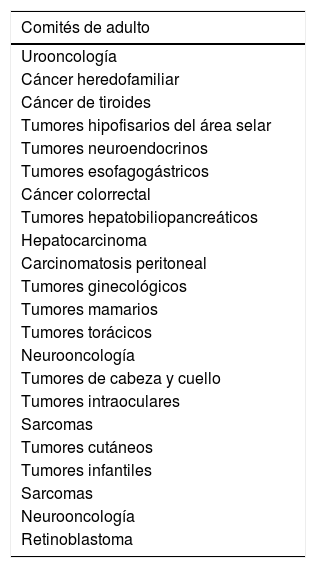La pandemia de COVID-19 ha puesto en una situación de sobrecarga al sistema sanitario español y, como consecuencia, la atención al paciente oncológico se ha visto afectada. El objetivo de este estudio es realizar un análisis descriptivo de la atención al paciente oncológico y del funcionamiento de los Comités de Tumores en el Hospital Universitario la Paz durante la primera ola de la pandemia.
Material y métodosAnálisis descriptivo basado en los resultados obtenidos a través de una encuesta realizada a los 18 comités de tumores del adulto y a los tres comités de tumores infantiles del Hospital Universitario La Paz. El estudio se completó con la información obtenida a partir de los servicios implicados en el diagnóstico y tratamiento de pacientes oncológicos.
ResultadosDurante la primera ola se disminuyó significativamente la realización de técnicas diagnósticas. Se suspendió la cirugía de la mayoría de tumores en el hospital durante varias semanas, retrasándose o derivándose a otro centro. Se mantuvieron los tratamientos sistémicos y radioterápicos asociados a un mayor beneficio, incrementándose la frecuencia de la administración preoperatoria. Sin embargo, el diagnóstico y tratamiento de los tumores infantiles no sufrió alteraciones. El funcionamiento de los comités de tumores se vio afectado, y cada uno de ellos llevó a cabo ajustes diferentes. Los diferentes servicios implicados realizaron planes de contingencia para minimizar el impacto sobre los pacientes.
ConclusiónEste estudio muestra cómo la atención al paciente oncológico y el funcionamiento de los comités de tumores se vio afectado de forma generalizada durante la pandemia por COVID-19.
The COVID-19 pandemic has over-burdened the Spanish health service and, as a result, affected the treatment and management of oncological patients. The aim of this study is to make a descriptive analysis of the management of oncological patients and the functioning of the tumour committees in the University Hospital La Paz (Madrid) during the first wave of the pandemic.
Materials and methodsA descriptive analysis was made, based on the results of a questionnaire given to all 18 adult tumour committees and 3 paediatric tumour committees in the University Hospital La Paz. Further information was obtained from all the hospital services involved in the diagnosis and treatment of oncological patients.
ResultsDuring the first wave of the pandemic, there was a significant decrease in diagnostic tests. For many weeks, the majority of oncological surgical procedures were delayed or referred to other hospitals. Highly beneficial systemic and radiotherapeutic treatments were maintained and preoperative treatment was increased. The diagnosis and treatment of paediatric tumours was unaltered. Tumour committees were affected but each one adjusted in a different way. All the departments involved in the diagnosis and treatment of oncological patients made contingency plans to minimalize the effect on patients.
ConclusionThis study shows how the management of oncological patients and the functioning of tumour committees was affected during the COVID-19 pandemic.
Artículo
Comprando el artículo el PDF del mismo podrá ser descargado
Precio 19,34 €
Comprar ahora











